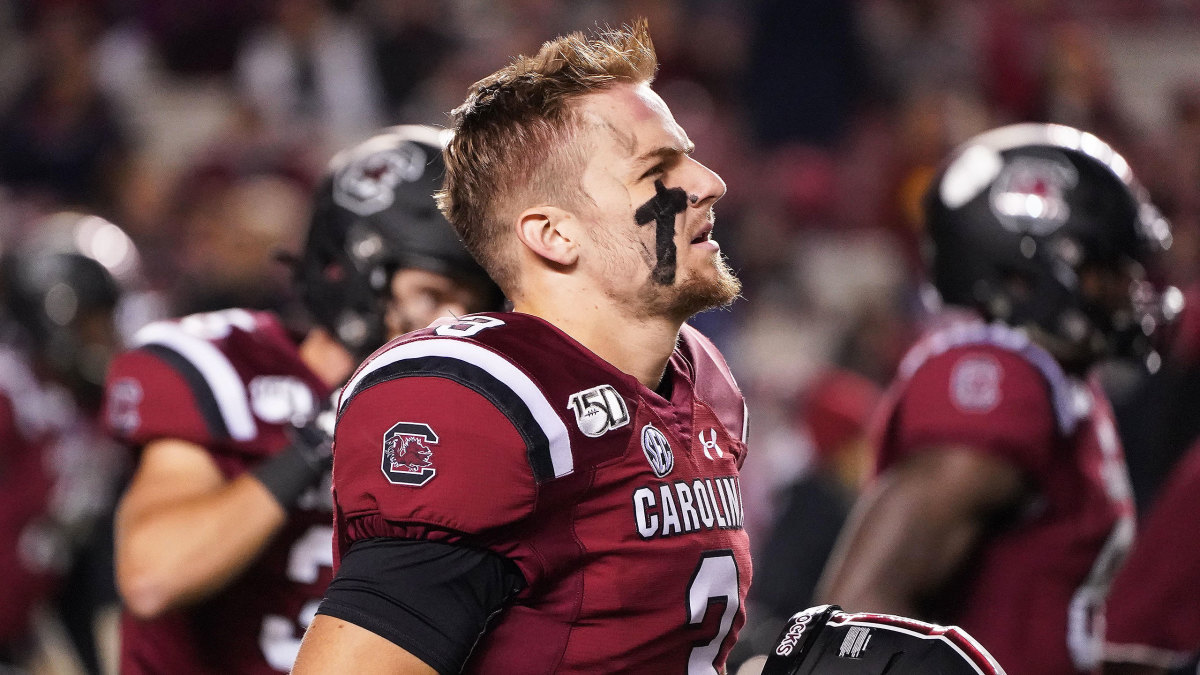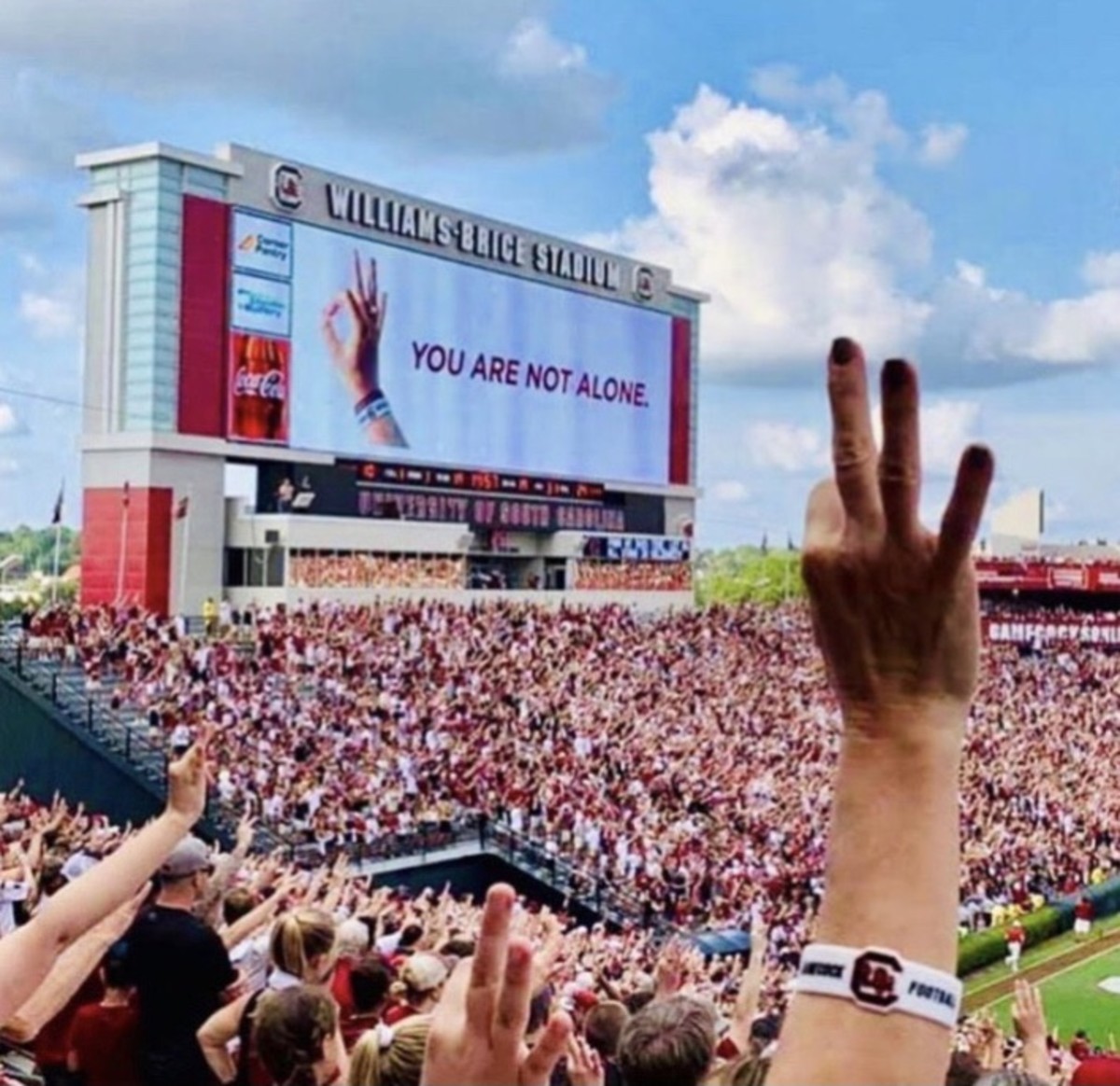'Hopefully, We Can Make a Difference:' Hilinski Family Readies for First College Football Mental Health Week
The messages come from everywhere, daily, from international addresses, from adults and kids, from students and professors, from people who need help and those offering support. These notes are sent to all members of the Hilinski family, or to their mental health foundation, Hilinski’s Hope. Sometimes, strangers share stories about loved ones they have lost to suicide; sometimes, they’re pleading for assistance and don’t know where else to turn. And sometimes, like in the case of 17-year-old Noah Whalen from Toronto, they have an idea—a small but smart idea that can be turned into a larger movement.
Whalen had seen the Hilinskis’ story: how three boys grew up in a football family, how they all played quarterback for Division I schools, how Tyler (the middle child) died by suicide in January 2018 and how all that led to the foundation, which Mark and Kym Hilinski have made into their life’s work. Whalen had cut up a video aimed at capturing college football fans by highlighting the family’s history over game clips. He sent it to Ryan, the youngest Hilinski brother, now a sophomore QB at South Carolina.

Ryan loved the video and shared it with his family. His mom, Kym, yelled out in joy when she watched it unspool on her computer screen. “I couldn’t imagine that a high school kid had done that,” she says. “Or that he lived in Canada and loves the Gamecocks.” Mark helped further edit the segment. ESPN personality Jen Lada added the voice-over. At that point, Mark says he thought, “Wait a second. What if we put together a college football mental health week? What if teams across the country played this video, or their own videos, in their stadiums?”
An idea grew from there. Mark researched what colleges did for World Mental Health Day (Oct. 10) and found the landscape mostly barren. Why couldn’t he create a universal option, he wondered, and maybe save some lives? Mark and Kym put together a plan, laid out a proposal and sent both that and the video to administrators at athletic departments across the country. He set a goal of reaching agreements with 10 schools and hosting an event for college football, #3Day, on Oct. 3, to kick off a full docket of mental health awareness week events. Soon after he started the emailing, 14 schools had signed on to participate. Among them: Alabama, Arkansas, Missouri, Ole Miss, Tennessee, Texas A&M and Vanderbilt.
In the PDF of the proposal, the Hilinskis note three ways that schools can partner with them: by affixing free stickers of lime green No. 3 (Tyler’s jersey number) ribbons onto their helmets (coaches can wear lapel pins); by creating a PSA or playing the foundation’s video at the start of the third quarter, encouraging fans to raise three fingers on the first play after kickoff; and by following up with campus engagement, in some cases using evidence-based programming from the foundation’s team of experts. All three measures take different routes to the same goals—raising mental health awareness, eliminating stigmas and caring for the mental wellbeing of college athletes who need help more than ever in the most turbulent year of most of their lives.
For interested schools, Kym sends a prepared box. It’s filled with information about 3Day, 100 lapels, 150 helmet decals and 200 of the foundation’s bands. Last week, Alabama approved wearing the decals on its helmets for its game on Oct. 3 against Texas A&M.
The Hilinskis saw their impact firsthand, almost exactly a year ago, when they asked the Gamecocks fans who cheered for Ryan to hold up those three fingers at a home game against Alabama. Mark couldn’t believe what happened that afternoon. It was overwhelming enough that something like 80,000 fans at Williams-Brice Stadium joined in the gesture, but then he looked down at the Crimson Tide sideline. There was Nick Saban—Nick Saban!—with three fingers held high above his head, and he wasn’t signaling for a field goal. “It’s hard to articulate how much that means,” Mark says. “Touching is the wrong word. But it’s really powerful and really meaningful.”

With a full and unprecedented mental health week in college sports, the Hilinskis hope to capture the momentum that started in that moment. On Oct. 6, for instance, they’re offering a free webinar to universities across the country, where they will explain their partnership with the NCAA’s Sports Science Institute and the best prevention strategies. They know their work can be especially impactful in times like these, with a pandemic raging amid the fight for social justice. They host a podcast, UNIT3D, dedicated to mental health, and every time they drop an episode (they average two or a three a week) they hear from people all over the world who are struggling. If they can reach some of those folks through college football, all the better. If they can expand the program to every school in America, to high schools and the pros, better still.
Most humans are out of rhythm right now, but especially college students. And college students who also play sports face unique challenges. They don’t have access to the usual treatments and coaches and routines that define their lives. They must know that it’s O.K. to not be O.K., that there are people, like the Hilinskis, who can help. “We hope this is in every stadium across the country eventually,” Kym says. “Hope is such a beautiful, strong word. We use it all the time. I have a lot of hope for this.”
“I don’t want to overstate this, but you’ve got lives on the line,” Mark says. “I don’t want to take myself too seriously, but I have to take the mission like that. Hopefully, we can make a difference with this week.”
The Hilinskis remain determined to tell Tyler’s story for the rest of their lives. What’s powerful—and hopefully snowballs—is how many thousands they’ve added to their team, expanding both their reach and their impact and leading to ideas like the one from Whalen that can make a real difference in the world.
